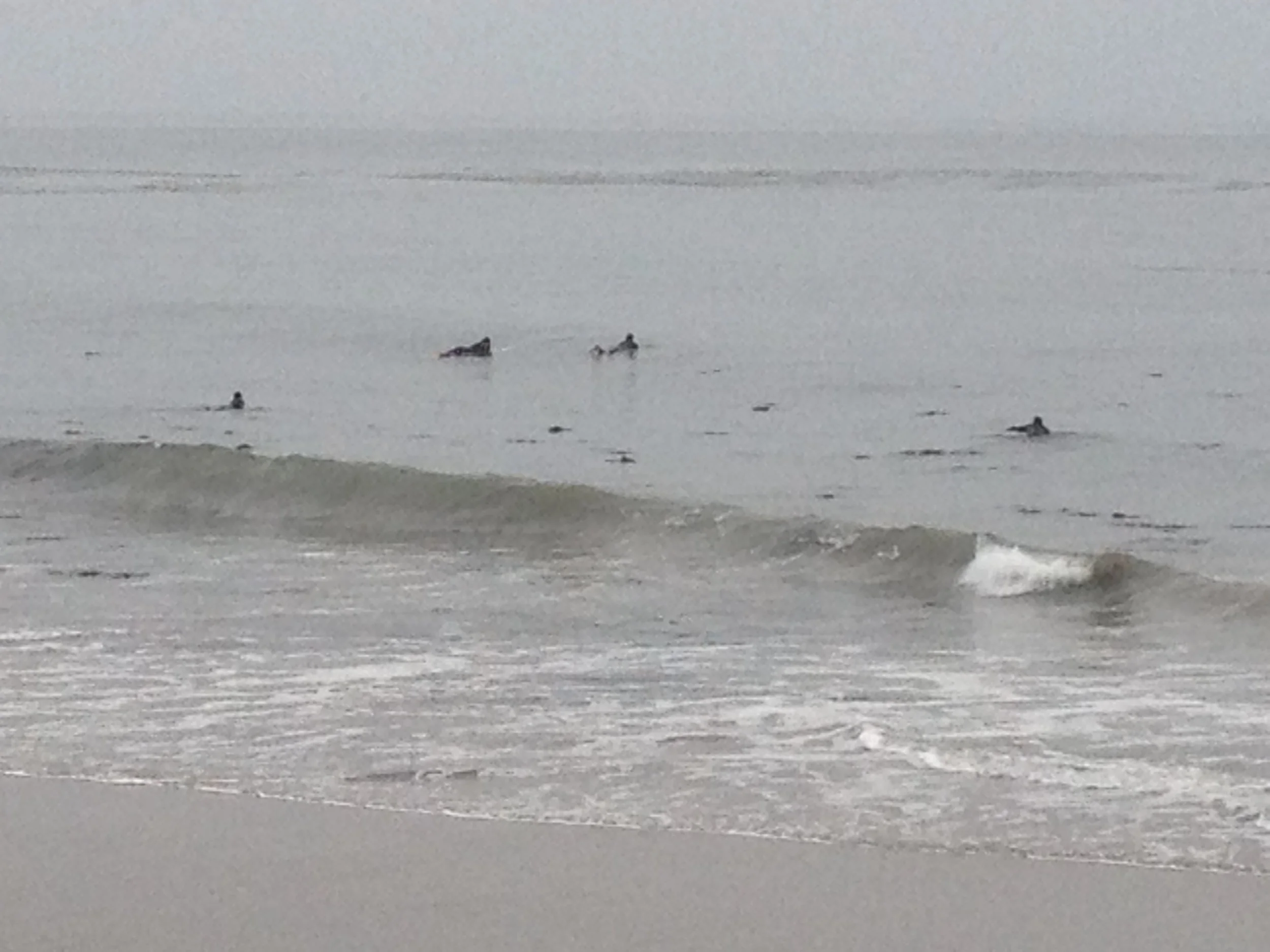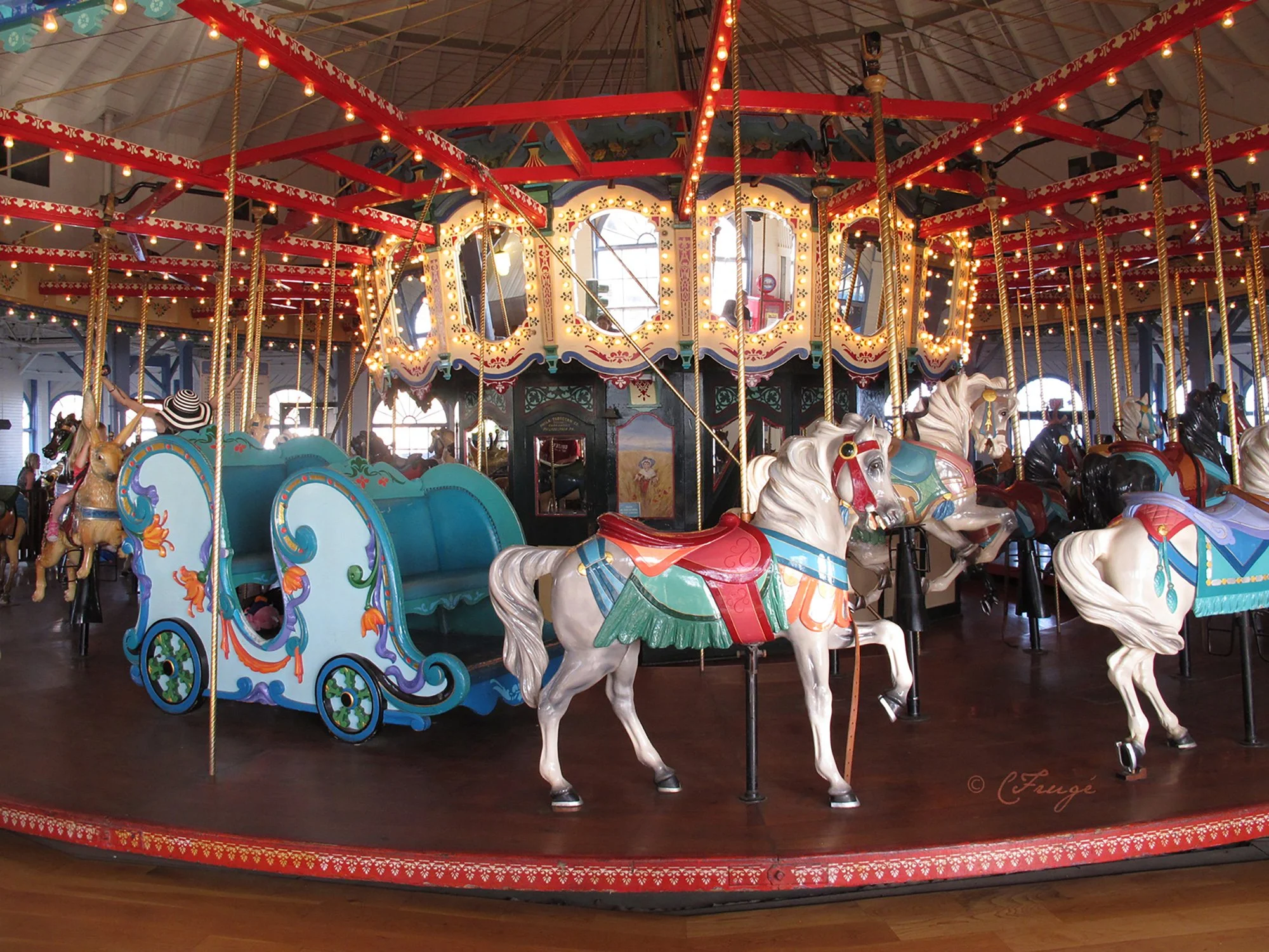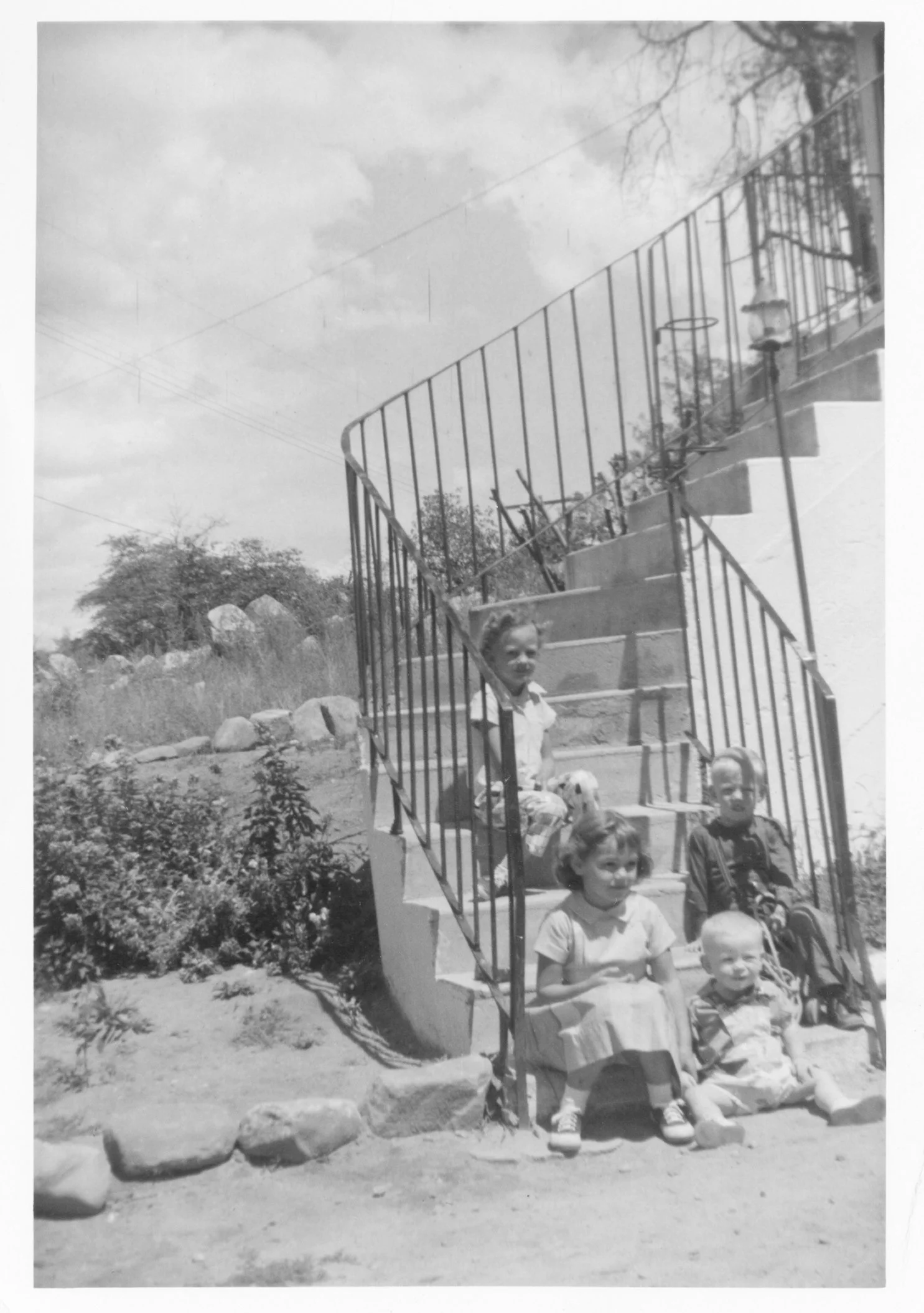Please Don’t Let Me Go
Like a favorite video, I retrieve, replay, and unwind memories of a happy time when the four of us lived in the same house as a family. In Ventura, California, I went to first grade at Sheridan Way Elementary.
Our stucco house at 702 Cedar Place sat perched on a mountain, nestled against dense terrain. Stacks of small houses with flat roofs lined this tree-covered mountain; narrow switchback streets cut a trail. Looking toward the mountain from the beach, the houses appeared to sit on top of each other.
Found our house still there in 2012. Made me happy to see this place well-cared for.
A plum tree in our backyard had a sturdy horizontal limb that I could inch along, holding the limb just above, to survey the town that lay below.
The Pacific Ocean reached to infinity and beyond.
The mountain behind our house had burned to the top during the year we lived there. A fire set by kids down the street left charred, fire-gobbled ground that stopped just a few feet from our property. That fire had crept up the mountain, mirroring the way the ocean met the shore and went no further. The smell of smoke wafted throughout the area for weeks, competing with the ocean’s inimitable scent that permeated this small seaside community.
Although the fire didn’t destroy the house where we lived, in Ventura our family combusted.
My mother’s anxieties smoldered.
A Day at the Beach
While I could view the ocean from our front yard, pale light flickering on the surface, nothing made me happier than our day-long outings to the beach. One blissful memory at the beach, my dad sat me bottom-down in a tire’s inner tube, telling me, “If I let go, you will float all the way to China.”
“Daddy, Daddy. Please don’t let me go.” Terrified, I didn’t know whether to cling to him or to the inner tube.
As he laughed, Daddy threw back his head, and I gripped the black tube tighter, leaning forward as if I could defy the ocean’s current to take me away.
Remembering that day, I catch myself licking my lips, expecting to taste salt from the ocean, to feel the burn on my cheeks, the heat on my hair and hear the rhythm of waves crashing––a reassuring resonance that thrummed like a reliable heartbeat. Memory and perception heightened helps me even now feel in sync with this one perfect childhood memory.
Ventura Beach from the highway
The week school started I got hit by a car. My mother saved the now yellowed newspaper clipping from the accident, reporting that 6-year-old Carol Reeves hit the car instead of the car hitting her.
My friend had already crossed the street. She called to me, “Come on,” indicating that the way was clear. Head down like a charging bull, my first day to walk home from first grade, I plowed into the side of a station wagon.
I remember riding in the ambulance, crying for my mother. Some stranger hovered over me. I remember bleeding, trying to wipe the blood from my right eye. And I remember wondering, How will my mother find out I am hurt? I need her.
Other than the scar I have on my forehead, just beneath my hairline, I don’t remember how long I was in the hospital or anything else.
That fall, a carnival came to town and at a sideshow game, my dad threw dimes aimed at glass plates raised on a platform inside the carnival booth. If a dime landed on one of the glass plates, the contestant won the prize. The best prize: A duck! A real, live, downy duck.
Daddy won a duck for Renée and me. Placed inside a carton like Chinese take-out, Renée and I tussled for a turn to carry the box so we could peek inside at the tiny peeping duckling.
On our way to the car, my mother spotted a little boy leaning against a tree. She spoke to him, drawn and responsive to the sad look on his face. Maybe he was lost.
No. The little boy had lost all his dimes trying to win a duck.
My mother took Renée and me aside. “Let’s give him our duck.”
Jumping up and down, I started to pout, insisting this was our duck. “Daddy won this duck for us.”
I don’t remember if Renée was willing to give the duck to the boy, but I bet she was. My protests won over Mom’s effort to show kindness to a stranger.
Once at home, the duck we named Daffy followed on my mother’s heels as if she were its mother. With every step, just about, Daffy pooped.
It didn’t take long for my mom to grow weary in duck-keeping, and on Halloween night, she gave away our baby duck––twice as big as when we got it––to a couple of girls who had asked for “Trick-or-Treat.”
The girls left our front porch arguing which one my mom had given the duck to. I laughed and cried at the same time. While we wondered whether the girls were sisters, my mom said the mother would think this prize was a terrible trick.
Sad as I felt to see the duck go, I later felt ashamed of myself for not giving the duck to the boy who had lost all his dimes. He had truly wanted that duck.
A boy and his duck––the scene etched in my memory as if the story turned out that way––a story I could read in a book. Only the story didn’t end like that.
Why did I even keep thinking about the boy? Having seen that little boy, leaning against a sprawling avocado tree, heartbroken to go home empty-handed, I accused myself. Why am I so selfish?
“Noblesse oblige,” my mother tried to teach, urging me to think of others and do something noble. “Noble gestures only count when the person for whom a gift is given or deed done cannot in turn pay you back.” Or something like that.
How was I to know or understand what she was talking about? I was in first grade.
Already I seemed destined to learn life lessons the hard way. The unforgettable way. The ways that left scars, inside and out.
The Ghost of Christmas Past
Weeks later, days after my seventh birthday, I opened every wrapped Christmas package under the tree that had my name on it. I could read.
Then, very carefully I re-wrapped each one. I lied when my mother asked if I had opened the gifts. How did she know?
She put away all my gifts except one. She hid the rest, disbursed these later, one-at-a-time randomly throughout the following months. I got the red plastic Coke-dispenser in August.
This replica of a fountain dispenser, about the size of a bread box, attached to an actual bottle of Coke installed inside the plastic housing. On the front, a dispenser handle tipped the bottle so that Coke poured into tiny replicas of Coke fountain glasses. She had saved the best gift for last!
Yet the incident planted a question that applied to many of my transgressions. Did the punishment fit the crime?
The Good, the Sad, and the Beauty of Life
“When a child first catches adults out — when it first walks into his grave little head that adults do not always have divine intelligence, that their judgments are not always wise, their thinking true, their sentences just — his world falls into panic desolation . . . And the child’s world is never quite whole again. It is an aching kind of growing. ”
Early snapshots show a different story of my family, leading me to imagine a happy life if my dad had not died. If my mom and dad had stayed together, could we have lived a better story?
My mom and dad tried many times and in various places to make a life together—Los Angeles, Ventura, Las Vegas––places where I went off to school, forging my own path and forming my earliest sense of identity.
My dad’s drinking made it hard for him to keep a job. He would go back to Prescott to work for my granddad. Mom said she had to live anywhere but Prescott. She said she could never live in Prescott after Renée had died there.
Front step: Me, Renee behind me, younger cousins Joe and Mike. I’m the only one still living.
While working for his dad, Vernon was known for the custom fireplaces he designed and built. I admired and loved him despite his problems. When my mom and dad separated, he drank a lot more. He had been drinking since early morning that Sunday he was killed.
I don’t think of my dad smelling like beer or the Lucky Strike cigarettes he smoked, the pack that bulged in his shirt pocket.
I do remember when our parakeet sat on the edge of his beer glass, bobbing for sips, and the bird fell in. My mother in one of her instant panics jumped up from her chair and dumped the contents on the floor. That bird eventually flew the coop––out the open front door, deaf to all entreaties to return to its cage.
Among family pictures framed in a collage, I sometimes stop to stare at a snapshot of my dad looking up, instead of at the camera. Frozen in a captured moment with a James Dean expression of daring recklessness, if not rebellion, both Dean and my dad died in tragic car accidents. Their youthful good looks preserved in black-and-white images, reminders of their mortal lives.
My dad’s sublime expression is the way I want to remember him––believing he crossed his finish line precisely on time, (sadly only days after his thirtieth birthday). Maybe, I told myself, he went to be with Renée, having to let go of Mom and me.
I clung to the memory of that day at the beach when I begged him, “Please, Daddy, don’t let me go.”
“From one man he [God] made all the people of the world. Now they live all over the earth. He decided exactly when they should live. And he decided exactly where they should live.”
After my dad’s funeral, Mom and I came home to our tiny apartment––75D Victory Village, Henderson, Nevada. She went back to work and I went back to Robert Taylor Elementary school where teachers and classmates gave me attention I needed.
At first, I liked being in the spotlight––most popular girl in third grade.
One day, I stood in front of the class and sang Marty Robbins’ El Paso––my dad’s favorite song. It’s a longgg song––almost 5-minutes!
Classmates applauded. My teacher Mrs. Miller hugged me in front of everyone, making me feel in that moment I was her favorite.
When my mother told me that Mrs. Miller had spoken to her about adopting me, I couldn’t help but wonder what being part of another family would feel like.
Our unhappy family was now down to two.






